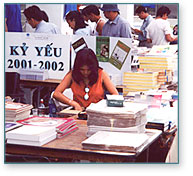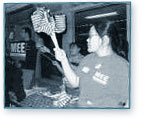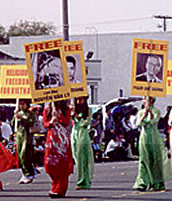|
Continue on page 1
Focusing on Domestic Issues
While the initial interest of Southeast Asian Americans in American politics has
to do with their concerns about homeland politics and U.S. foreign policy, they
have also focused on domestic issues. They have lobbied for more social services,
better health care, improved schools, and fair treatment by the police. They have
also supported labor unions and immigrant rights and spoke out against  environmental
racism and hate crimes. For example, projects organized by youth, many of them
female, have progressive agendas. These include the Asian Pacific Environmental
Network (APEN) working with the Laotian community in Northern California; Khmer
Girls in Action (KGA) with the Cambodian community in Southern California; and
CAAAV: Organizing Asian Communities with Southeast Asian American communities
in New York City. environmental
racism and hate crimes. For example, projects organized by youth, many of them
female, have progressive agendas. These include the Asian Pacific Environmental
Network (APEN) working with the Laotian community in Northern California; Khmer
Girls in Action (KGA) with the Cambodian community in Southern California; and
CAAAV: Organizing Asian Communities with Southeast Asian American communities
in New York City.
In some cases, these issues have divided communities. For instance, when women
and their male allies have spoken out against domestic violence in their communities,
they have experienced criticism from the traditional male leadership who prefer
not to discuss this topic. Each of the ethnic communities has a diversity of political
perspectives, and there is often internal dissension within a group. As they gain
more organizational experience, Southeast Asian Americans will continue to engage
in both traditional and non-traditional political activities.
Promoting Citizenship
 Crucial to becoming a political force is encouraging more individuals to become
U.S. citizens. Citizenship classes are offered in local areas, but it is still
difficult for some to find time to learn English and study the historical information
necessary to pass the citizenship test. The Refugee Act of 1980 allows a refugee
to become a permanent resident after one year and after four more years to become
a U.S. citizen. Southeast Asians have a high rate of naturalization. They become
U.S. citizens in order to help sponsor family members as immigrants and to feel
secure if they are traveling back to their homeland. For many community members,
a next step is to encourage these naturalized citizens, along with their U.S.
born children who are automatically U.S. citizens, to vote and to unite as ethnic
constituencies. Crucial to becoming a political force is encouraging more individuals to become
U.S. citizens. Citizenship classes are offered in local areas, but it is still
difficult for some to find time to learn English and study the historical information
necessary to pass the citizenship test. The Refugee Act of 1980 allows a refugee
to become a permanent resident after one year and after four more years to become
a U.S. citizen. Southeast Asians have a high rate of naturalization. They become
U.S. citizens in order to help sponsor family members as immigrants and to feel
secure if they are traveling back to their homeland. For many community members,
a next step is to encourage these naturalized citizens, along with their U.S.
born children who are automatically U.S. citizens, to vote and to unite as ethnic
constituencies.
|


 environmental
racism and hate crimes. For example, projects organized by youth, many of them
female, have progressive agendas. These include the Asian Pacific Environmental
Network (APEN) working with the Laotian community in Northern California; Khmer
Girls in Action (KGA) with the Cambodian community in Southern California; and
CAAAV: Organizing Asian Communities with Southeast Asian American communities
in New York City.
environmental
racism and hate crimes. For example, projects organized by youth, many of them
female, have progressive agendas. These include the Asian Pacific Environmental
Network (APEN) working with the Laotian community in Northern California; Khmer
Girls in Action (KGA) with the Cambodian community in Southern California; and
CAAAV: Organizing Asian Communities with Southeast Asian American communities
in New York City.  Crucial to becoming a political force is encouraging more individuals to become
U.S. citizens. Citizenship classes are offered in local areas, but it is still
difficult for some to find time to learn English and study the historical information
necessary to pass the citizenship test. The Refugee Act of 1980 allows a refugee
to become a permanent resident after one year and after four more years to become
a U.S. citizen. Southeast Asians have a high rate of naturalization. They become
U.S. citizens in order to help sponsor family members as immigrants and to feel
secure if they are traveling back to their homeland. For many community members,
a next step is to encourage these naturalized citizens, along with their U.S.
born children who are automatically U.S. citizens, to vote and to unite as ethnic
constituencies.
Crucial to becoming a political force is encouraging more individuals to become
U.S. citizens. Citizenship classes are offered in local areas, but it is still
difficult for some to find time to learn English and study the historical information
necessary to pass the citizenship test. The Refugee Act of 1980 allows a refugee
to become a permanent resident after one year and after four more years to become
a U.S. citizen. Southeast Asians have a high rate of naturalization. They become
U.S. citizens in order to help sponsor family members as immigrants and to feel
secure if they are traveling back to their homeland. For many community members,
a next step is to encourage these naturalized citizens, along with their U.S.
born children who are automatically U.S. citizens, to vote and to unite as ethnic
constituencies.